
Pasta with tomatos & pine nuts, Ice cream, Apple Tortes
"James Hilton later said it took only four days to write Goodbye, Mr. Chips.
He had promised a short story to a British magazine -- but hadn't a notion what to write about. So he went off on a bicycle tour and the idea for a tale about a schoolmaster came to him as he wheeled through Epping Forest.
After four days at the typewriter Hilton had over seventeen thousand words, far too much for a short story, but his editors knew they had something special and published it anyhow as a special supplement in their magazine. Has any writer ever had a more profitable four days work?" LINK
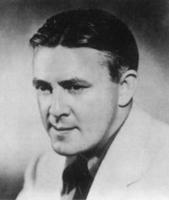
Author James Hilton
"While best known for creating Mr. Chips, the quintessential English schoolteacher, James Hilton was less a Lancashire lad than a Hollywood insider. After early success as a novelist, he made his mark during the golden age of the movies, penning scripts for Frank Capra and Greer Garson and collaborating with Frances Marion, the most successful female screenwriter of her day.Director Sam Wood
In 1935, after the success of Goodbye Mr. Chips, Hilton was invited to Hollywood to work as a screenwriter. Before leaving, he married his live-in girlfriend, Alice Brown, a secretary at the BBC. As Hilton was by now becoming a public figure, they traveled to Eastbourne to avoid any scandal over their previous illicit living arrangement. The American press awaited their arrival in New York, where husband and wife gave interviews before continuing on to Los Angeles, where again they were given a tremendous reception. The glittering Hollywood lifestyle would prove disastrous for Hilton's marriage, which ended in divorce in 1937. Only seven days later he married Galina Kopineck, a young starlet (who he would also divorce eight years later).
While Hollywood undid Hilton's personal life, his career thrived there. He won the Best Screenplay Oscar for Mrs. Miniver (1942); actress Greer Garson also earned a Best Actress Oscar in the title role. Directed by William Wyler, the film depicts a middle-class English family's life during first months of World War II. Hilton also wrote screenplays for Camille (1936), Foreign Correspondent (1940), Forever and a Day (1943), The Story of Dr. Wassell (1943), The Tuttles of Tahiti (1942) and We Are Not Alone (1939). Other screenwriters adapted his novels Knight Without Armour (1937), Lost Horizon (1937), Rage in Heaven (1941), and Random Harvest (1942). Robert Donat won a Best Actor Oscar for the title role in Goodbye Mr. Chips (1939), but Hilton could not entirely take credit for the success of this film; Eric Maschwitz, C. Sherriff, and Claudine West had adapted his novel for the screen." LINK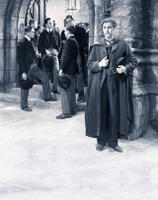
"When American director Sam Wood first reported to Cecil B. De Mille as an assistant in 1915, Wood had already dabbled in real estate and acted on-stage under the name of Chad Applegate. A solo director by 1919, Wood worked throughout the '20s directing some of Paramount's biggest stars, among them Gloria Swanson and Wallace Reid. He began his long association with MGM in 1927, working with personalities as varied as Marion Davies, Clark Gable, Marie Dressler, and Jimmy Durante. He guided the Marx Brothers through their two most profitable films, A Night at the Opera (1935) and A Day at the Races (1937), and turned out one of the most accomplished sentimental dramas ever made in Hollywood, Goodbye, Mr. Chips (1939).
Hopping from studio to studio in the '40s, Wood directed Ginger Rogers through her Oscar-winning performance in Kitty Foyle (1940), successfully transferred Thornton Wilder's highly theatrical Our Town (1940) to the screen (even the studio-imposed happy ending worked), and assembled the quintessential baseball biopic, The Pride of the Yankees (1942).
The list of Wood's successes would seem to assure him a niche in the ranks of all-time best Hollywood directors, yet his reputation has tarnished since his death in 1949. Most detractors insist that Wood was a hack, citing his habit of shooting each scene an average of 20 times, his only verbal direction in each instance being "Go out there and sell 'em a load of clams."
In truth, this technique was invaluable in wearing down such mannered performers as Walter Brennan, Dan Duryea, Frank Morgan, and Wallace Beery, until they were tired enough to behave like human beings instead of play-actors. The 20-take habit also enabled the more limited actors to re-think their interpretations until they'd found nuances that they would never have considered on the first take: Ronald Reagan, who was certainly no Olivier, was never better than in Wood's Kings Row (1942).
Taking into consideration all the complaints about Sam Wood, the biggest bone of contention seems to be his reactionary politics. Wood was active in a number of right-wing organizations, and in 1947 he virulently condemned Hollywood's "left" before the House Un-American Activities Committee. Those whose politics are diametrically opposite to Wood's dwell incessantly upon this aspect of his life, embellishing the facts by painting him as a bigot and (in the words of Groucho Marx) a "fascist." But just as it is fitting and proper to separate the performances of a Jane Fonda, Shirley MacLaine, or Paul Newman from their political agendas, so too would it be fair to extend the same courtesy to Wood. No matter what sort of man Sam Wood was personally, his string of Hollywood hits should be his true legacy." LINK
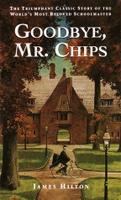
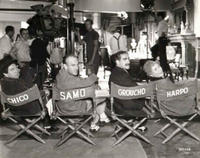
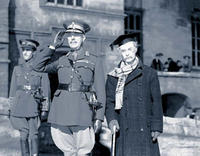


No comments:
Post a Comment